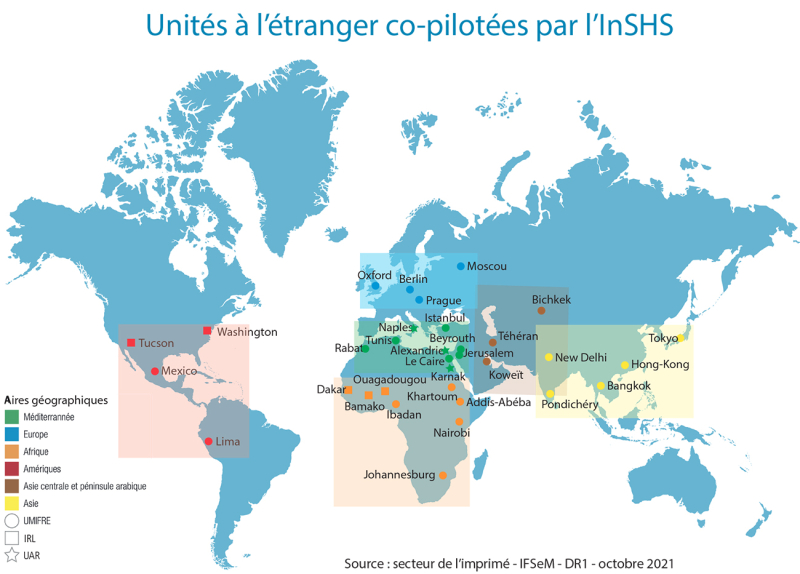A unique network of research units in other countries
The Institute of Humanities and Social Sciences jointly steers a network of research units in other countries which enables special partnerships to be set up in different regions of the world and plays a pivotal role in the internationalization of French HSS.
French research centres, schools and institutes
The Institute for Humanities and Social Sciences works with research centres and major French institutions in other countries to promote our units' European and international ambitions. This network is one of the most important tools for structuring research in Europe and internationally.
The INSHS co-manages three service and research units (USRs) - the Jean-Bérard Centre (Naples), the Centre d'études alexandrines (Alexandria) and the French-Egyptian Centre for the Study of the Temples of Karnak. These centres are shared with two French Schools abroad (the École Française de Rome and the French Institute for Eastern Archaeology in Cairo) and with the Egyptian Ministry of Antiquities.
The INSHS has partnerships with major local universities in three international laboratories - in Tucson, Washington and Dakar/Bamako/Ouagadougou (multi-site unit).
Finally, the INSHS is unique in that it co-directs a unique network within the CNRS - that of French International Research Laboratories (UMIFRE) - in partnership with the French Ministry for Europe and Foreign Affairs.
All these units offer researchers, academics (hosted with delegated positions) and doctoral students a wide range of opportunities for mobility in their careers.
The INSHS has also signed scientific agreements with five French schools abroad – the French School at Athens, the École Française de Rome, the French School of Asian Studies, the Casa de Velázquez and the French Institute for Eastern Archaeology. These five establishments are under the authority of the Ministry of Higher Education, Research and Innovation and have represented the excellence of French research abroad for several centuries now. They are important organisations for disseminating and promoting research carried out at the INSHS.

Mobility abroad
The procedure governing the mobility of researchers abroad depends on the status of the host institution. The INSHS insists that researchers who choose to work in other countries can only do so in the framework of research programmes supported by the Institute. These require the prior agreement of the Institute in accordance with current CNRS rules. The maximum continuous period for working in other countries is three years. Academics can qualify for specific mobility offers through delegated positions to host institutions. CNRS staff working in other countries are under the administrative authority of the CNRS Michel-Ange regional office.
Posting abroad
CNRS researchers are directly posted by the Institute to IRLs-UMIFREs-UARs but their salaries are still paid by the CNRS in accordance with the 1967 law on French civil servants working in other countries.
Secondment
In the case of secondment, researchers are fully administratively and financially supported by the host organisation. This is the case for positions in major French institutions abroad paid for by the Ministry for Europe and Foreign Affairs or by the Ministry of Higher Education, Research and Innovation. Acceptance for such posts is based on procedures outside the CNRS. However, secondment has to be approved by the Institute which also requests the opinion of unit directors.
Delegated positions
Since 2007 the Institute has supported the policy of delegating academics to the French centres it jointly directs in other countries. This procedure respects the timetable and normal procedures for delegated postswhich regulate the links between the CNRS and higher education and research institutions. The conditions for delegated posts abroad are governed by the 1967 law.
Secondment
In the case of secondment, researchers are fully administratively and financially supported by the host organization. This is the case for positions in major French institutions abroad paid for by the Ministry for Europe and Foreign Affairs or by the Ministry of Higher Education, Research and Innovation. Acceptance for such posts is based on procedures outside the CNRS. However, secondment has to be approved by the Institute which also requests the opinion of unit directors.
Delegated positions
Since 2007 the Institute has supported the policy of delegating academics to the French centres it jointly directs in other countries. This procedure respects the timetable and normal procedures for delegated postswhich regulate the links between the CNRS and higher education and research institutions. The conditions for delegated posts abroad are governed by the 1967 law.